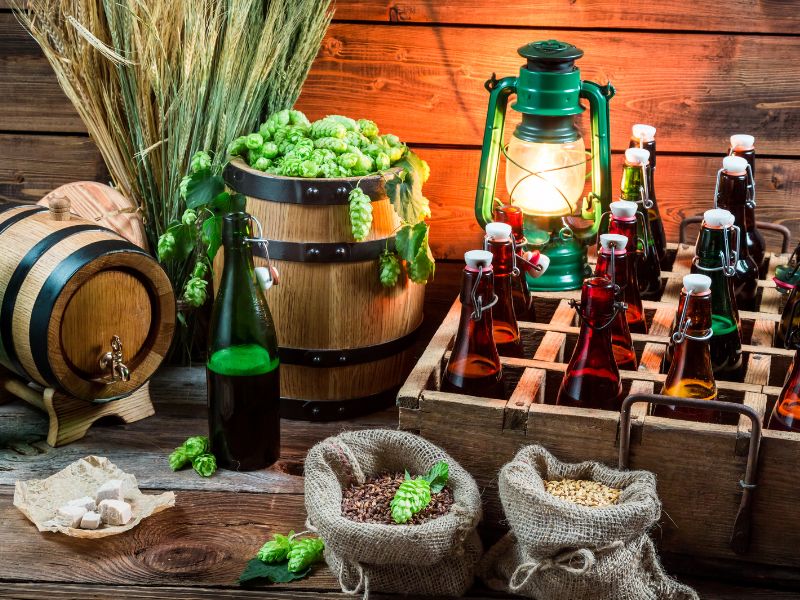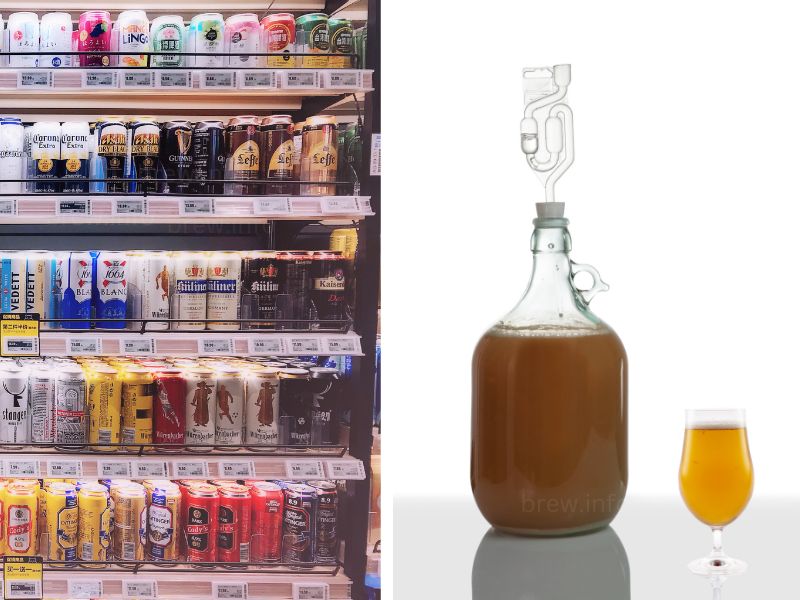Homebrewing – A Personal Touch
Homebrewing is an art. When you brew your own beer, you have full control over the ingredients, the process, and the final result. It’s an opportunity to explore different flavors and techniques, experimenting with various combinations to create a truly unique brew. From selecting the finest grains, hops, and yeasts to fine-tuning the fermentation process, the journey of creating your own beer is a rewarding one.
Commercial Beer – Consistency and Convenience
On the other hand, buying commercial beer provides consistency and convenience. With a vast array of choices on the market, you can always find something to suit your taste buds. Commercial breweries have perfected their recipes over time, delivering a reliable and high-quality product. Plus, you don’t have to worry about the brewing process or invest in equipment, which saves time and effort.
Flavor – The Taste Test
One of the significant differences between homebrewing and commercial beer is flavor. Homebrews offer a chance to experiment with taste, allowing you to create a beer that matches your preferences. You can tweak recipes to your liking, resulting in a customized and unique flavor profile.
Commercial beer, however, has been tailored to appeal to a broader audience. The flavors are often more standardized, with popular styles like IPAs, stouts, and lagers dominating the shelves. That said, craft breweries have been pushing the boundaries, introducing new and exciting flavor combinations.

Cost – Breaking Down the Numbers
Many people wonder whether homebrewing is more cost-effective than buying commercial beer. The answer varies, depending on factors such as initial investment, ingredients, and batch size.
Homebrewing requires an upfront investment in equipment, such as fermenters, kettles, and bottles. However, once you’ve acquired the necessary tools, the cost of ingredients for each batch tends to be lower than purchasing commercial beer. In the long run, homebrewing can be more cost-effective, particularly if you brew large batches.
Commercial beer prices can range from budget-friendly to more expensive, depending on factors like brand, style, and location. For those who enjoy a variety of beers or don’t want to invest in equipment, buying commercial beer may be the better choice.
Let’s go over the rough numbers for comparison:
Initial Homebrewing Investment:
- Basic equipment kit (fermenter, kettle, bottles, and other essentials): $100 – $200
- Optional equipment (wort chiller, kegging system, etc.): $50 – $500
Homebrewing Ingredients per Batch:
- Malt extract or grains: $15 – $40
- Hops: $3 – $15
- Yeast: $4 – $10
- Water and other miscellaneous items: $1 – $5
Total cost per 5-gallon homebrew batch (approximately 50-53 12-ounce bottles): $23 – $70
Cost per bottle of homebrew: $0.43 – $1.40
Buying Commercial Beer:
- Budget beer (12-pack): $10 – $15 ($0.83 – $1.25 per bottle)
- Mid-range beer (12-pack): $15 – $25 ($1.25 – $2.08 per bottle)
- Craft beer (6-pack): $10 – $15 ($1.67 – $2.50 per bottle)
- High-end beer (4-pack): $15 – $25 ($3.75 – $6.25 per bottle)
Note that these are only ballpark figures, as actual prices may differ by region, manufacturer, and other variables. As was previously noted, homebrewing becomes more economically viable when production volumes rise and the upfront cost of equipment is spread out over a longer period of time. On the other hand, you may try out new beer styles without having to commit to expensive equipment or ingredients by purchasing commercially brewed beer.
If you’re the one brewing the beer, the secret ingredient is time. When time is considered, commercial beer is likely to be less expensive than homebrewing.
Quality – Craftsmanship and Skill
The quality of your beer, whether homebrewed or commercial, depends on the skill of the brewer and the quality of the ingredients used.
Homebrewers can source high-quality ingredients and apply their knowledge and skill to create a top-notch final product. However, it may take some trial and error to perfect your recipe and process.
Commercial breweries, particularly craft breweries, are known for their commitment to quality. With experienced brewers and access to top-tier ingredients, they produce consistently high-quality beers. Nonetheless, not all commercial beers are created equal, and quality can vary between brands and styles.
Environmental Impact – The Green Factor
Sustainability is an essential consideration in today’s world. Homebrewing can have a lower environmental impact than buying commercial beer, as it reduces transportation and packaging waste.
By brewing at home, you can use reusable bottles and minimize the carbon footprint associated with transporting beer from the brewery to the store and then to your home. Plus, sourcing ingredients locally can further reduce your environmental impact.
Commercial beer production can have a higher environmental impact due to transportation, packaging, and production processes. However, many breweries are adopting sustainable practices, such as reducing water usage, utilizing renewable energy, and recycling waste.
Community – Building Connections
Homebrewing offers a unique opportunity to connect with like-minded individuals. There are numerous homebrew clubs, online forums, and events where you can share your passion, exchange ideas, and learn from others.
Buying commercial beer can also foster connections, as you can bond with fellow beer enthusiasts over a shared appreciation for different styles, brands, and flavors. Attending beer festivals, visiting craft breweries, and participating in beer tastings can help you broaden your horizons and meet new people.
Learning Curve – Mastering the Art
Homebrewing can be a fulfilling hobby, but it comes with a learning curve. You’ll need to invest time and effort into understanding the brewing process, perfecting your technique, and troubleshooting any issues that arise. However, the sense of accomplishment that comes with creating your own beer is well worth the effort.
In contrast, buying commercial beer requires no brewing knowledge, making it an accessible option for those who simply want to enjoy a good beer without hands-on experience.

Flexibility – Catering to Your Preferences
Homebrewing allows you to cater to your specific preferences or dietary restrictions. For instance, you can create gluten-free or low-alcohol beers, which might be harder to find in commercial varieties. You also have the option to use organic ingredients, ensuring that your beer aligns with your personal values.
Commercial beer, while offering a wide range of options, may not cater to every preference or dietary need. That said, the growing craft beer scene has led to increased diversity in available styles and flavors, making it easier to find a beer that suits your tastes.
The Verdict – Homebrewing vs Buying Commercial Beer
Ultimately, the choice between homebrewing and buying commercial beer comes down to personal preference and priorities.
Homebrewing offers a hands-on, creative experience, allowing you to craft unique flavors and styles while potentially reducing your environmental impact and fostering a sense of community. However, it requires an investment in equipment, time, and knowledge. In the end, it’s a hobby, and the brewing process itself should bring you joy.
Buying commercial beer provides consistency, convenience, and access to a wide variety of styles and flavors without the need for brewing expertise or equipment. It’s an excellent option for those who want to explore different beers or simply enjoy a quality beverage without the commitment of homebrewing.
Whichever path you choose, the world of beer offers endless opportunities for exploration and enjoyment. So, whether you’re a seasoned homebrewer or a fan of commercial brews, there’s always something new to discover and savor.
© 2011-2023 by Brew.info. All rights reserved. No part of this document may be reproduced or transmitted in any form or by any means, electronic, mechanical, photocopying, recording, or otherwise, without prior written permission of Brew.info.







